Photos show how common mistakes can drastically change homemade pancakes
Rachel Askinasi

- I intentionally made common mistakes while making pancakes from scratch to see how they would affect each batch.
- From doubling up on eggs to mistaking baking soda for baking powder, the margin for error with homemade pancakes is vast.
- Adding too much milk made for a sweet, crepe-like pancake while leaving out most of the sugar made for a bland flavor.
- Using baking soda resulted in a horribly metallic taste that left me with an inedible pancake.
I can count on one hand the number of times I've made pancakes from scratch. It's hard to mess up using a mix (Bisquick Shake 'n Pour is a pantry staple of mine), but there's a number of ways homemade pancakes could go wrong.
Curious to see what would happen to a batch of pancakes when something goes amiss, I deliberately made mistakes while working with the same recipe and documented the result. For the sake of consistency, I stuck to the same Martha Stewart recipe to make 14 batches of pancakes without any mix-ins. It's worth noting that I chose to use butter throughout the experiment — Stewart's recipe calls for unsalted butter or vegetable oil — with the exception of one batch made with oil.
From mistaking baking soda for baking powder to using too much milk, here's what happened.
Too much flour made for a tall and fluffy pancake.
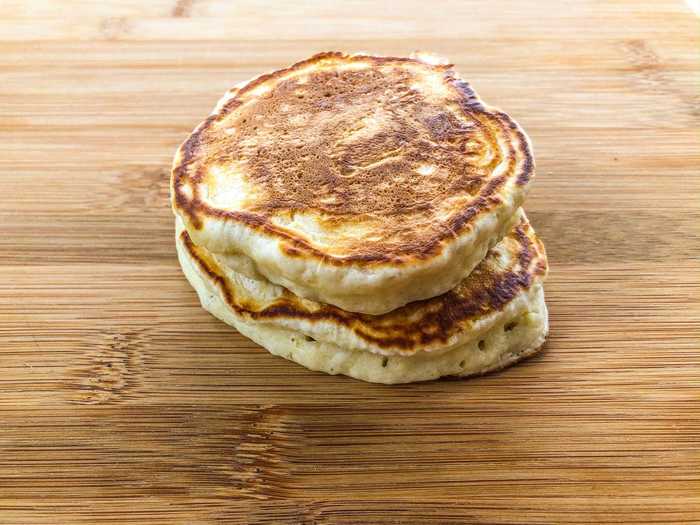
While I was making the batter for this pancake, I packed my flour into the measuring cup. Packing flour means patting it into the measuring cup or tapping the cup on a counter to level out the powder. Doing that will actually lead to mistakes in measuring, and you'll end up using too much.
In this case, adding extra flour made for super fluffy pancakes that rose to 1-inch thick.
While the pancakes were more spongey inside than they were moist, they weren't completely dried out. And though the texture turned a bit glue-like while I was chewing, they still had a tasty, classic pancake flavor.
On the contrary, not using enough flour made for a drippy batter that spread out over the pan.
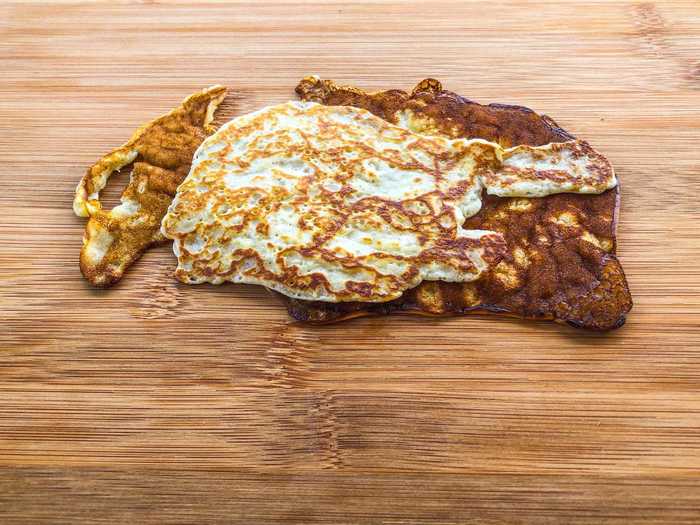
I used half the called-for amount of flour to make this batch. The batter was runny but had tiny chunks of flour throughout, and the pancakes came out extremely thin.
When I picked up the pancakes I found that they were super oily to the touch and left me with grease all over my hands. And without enough flour, the flavor was heavy on both butter and salt.
If you find yourself pouring extra runny batter onto your pan, I'd suggest adding some more flour before making the next pancake.
The extra sugar I used for this batch came through in the flavor of the pancakes.
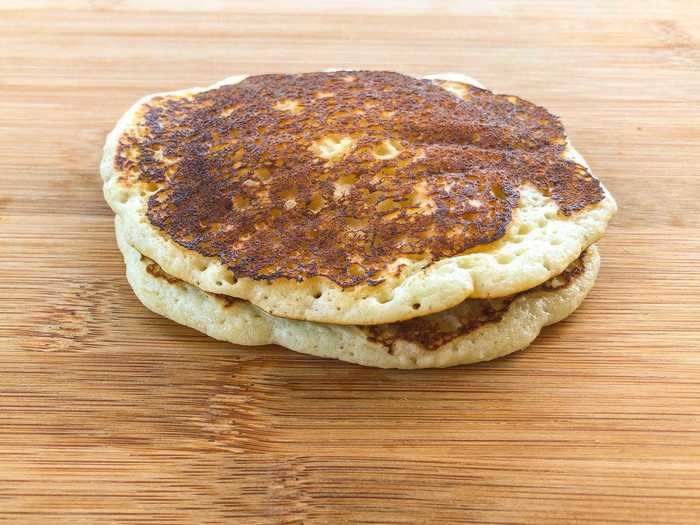
In terms of texture and size, these pancakes were moist inside and rose to about 1/4-inch thick.
Not only were these pancakes sweet, but I was able to clearly taste the distinct flavor of the white, granulated sugar I used in the batter.
Using less than the called-for amount of sugar made for a non-sweet pancake.
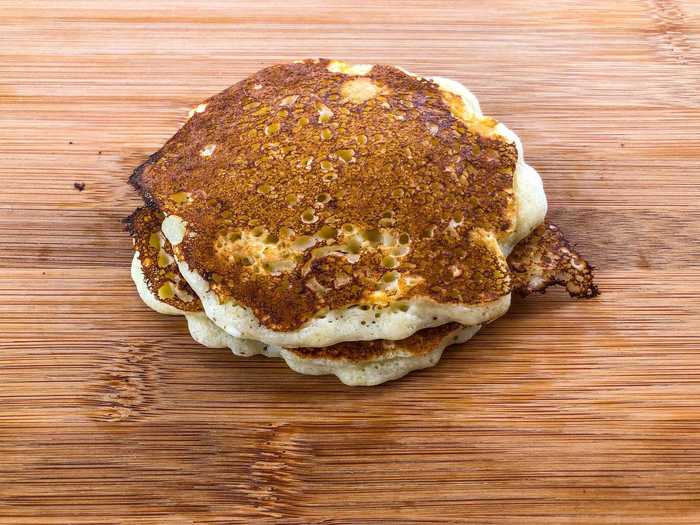
Just as using too much sugar was clearly too sweet, not using enough resulted in pancakes that were noticeably not sweet.
Each pancake rose to around 1/4-inch thick and the texture was moist throughout.
While these weren't extremely tasty on their own, I would recommend leaving out some of the called-for sugar if you're planning on topping your pancakes with something sweet like chocolate, maple syrup, or berries.
Baking soda made these pancakes taste horribly metallic.
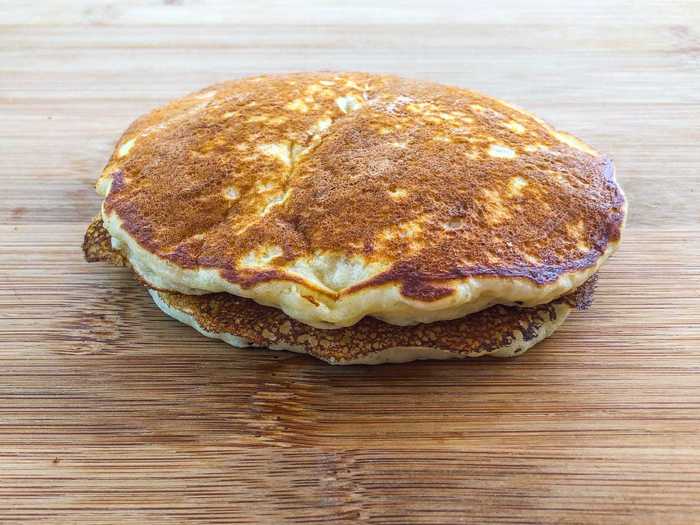
These looked awesome, and they puffed up around one full inch in the center while they were in the pan. Once I put them onto a plate, however, they deflated to around 1/2 inch.
Taking a bite, I found that the flavor of these pancakes was offensively metallic. It tasted so chemical-like that I had to spit it out after chewing. Even after I spit them out, the flavor lingered on my tongue.
If you make this mistake with your pancake batter, do yourself a favor and start again — it's just not worth it. That said, if you really want to try and salvage your batter, a tip on Reddit — as well as several independent blog posts I read — suggests adding cream of tartar or an acid like lemon juice to balance the flavor.
Using too much baking powder made my pancakes fluffier.
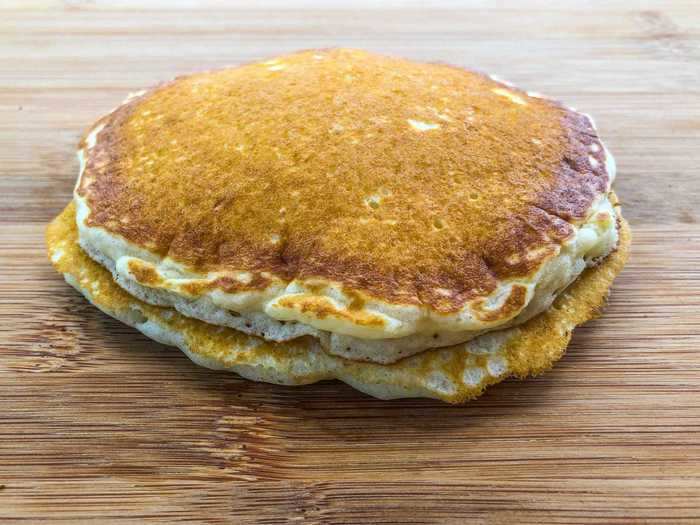
It's easy to mistake instructions calling for a teaspoon for instructions calling for a tablespoon. So, for this batch, I used a tablespoon of baking powder instead of a teaspoon.
The result was extremely lightweight, airy, and fluffy pancakes that rose to a little more than 1/4-inch thick. The taste was spot-on with classic pancake flavors, so if you grab the spoon marked "tbsp" rather than "tsp," don't worry — your pancakes will likely be delicious anyway.
Too much milk left me with a uniquely sweet, ultra-flat pancake.
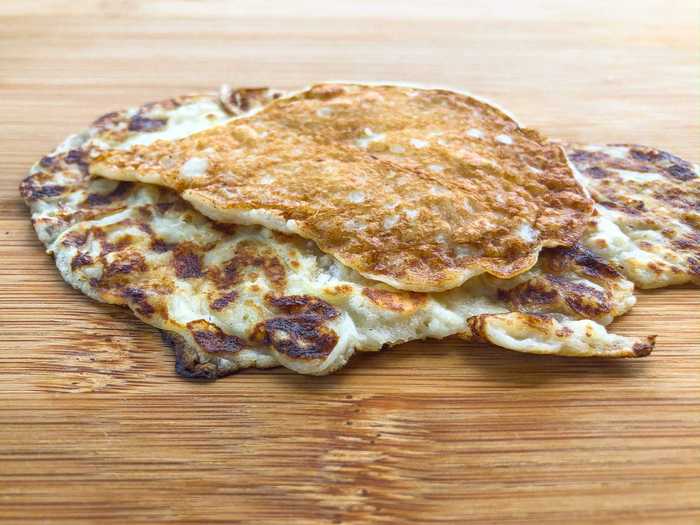
I used double the called-for amount of milk for this batch. Even though the batter was runny and had clumps of flour floating around, and the pancakes themselves were thin, the flavor was actually really good, in my opinion; they tasted sweet but more milky sweet than sugary.
I had to adjust the flame on these after burning my first one, though. So if you're looking to make pancakes like this, I'd recommend cooking them on medium-low heat and keeping a close eye on them.
Not using enough milk made for a slightly dry, super fluffy pancake.
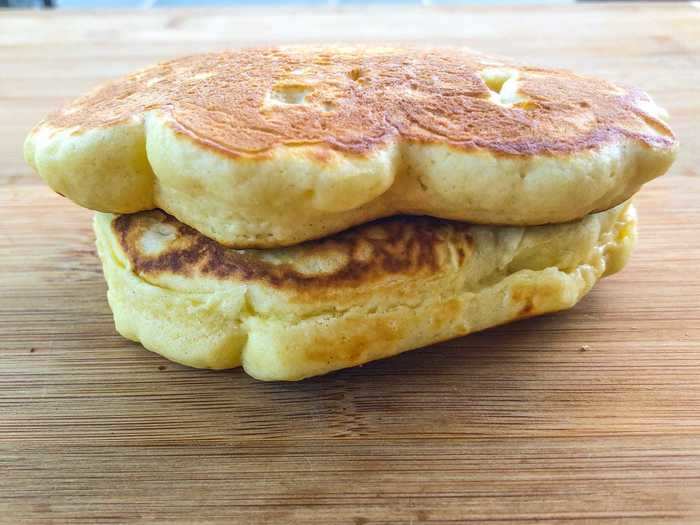
By leaving out most of the called-for milk in this batch of pancakes, I was left with a thicker batter. This batter made dense but still fluffy pancakes.
The flavor was pretty much on point for what you'd expect from a traditional pancake; it was just missing that milky-sweet component that some of the others had.
These pancakes also took longer to cook through completely than the others did.
Standing a little more than 1-inch tall, I think these pancakes would be great with something like chocolate chips or oozy berries baked inside. I also think topping them with jam or marmalade would be a fabulous idea.
Adding extra egg cut out nearly all of the pancake flavor.
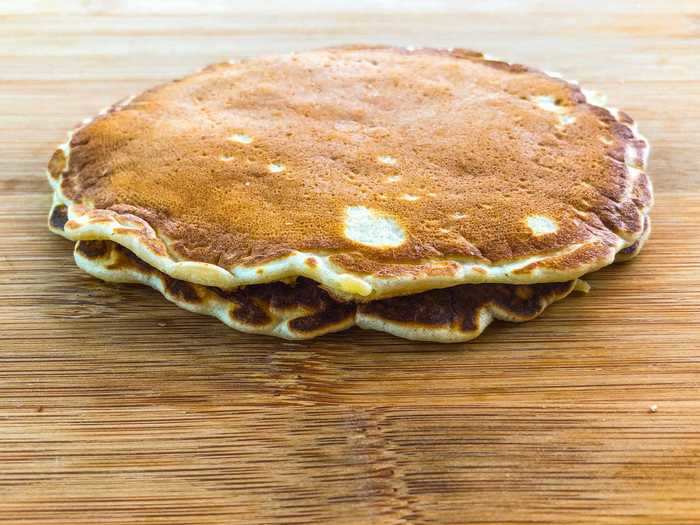
I doubled the eggs here, which made for a little bit more of a solid and jiggly pancake.
They were heavier and floppier than the other pancakes in this trial and had a very muted flavor. These pancakes also didn't rise to more than 1/4-inch thick.
If you realize you added too many eggs, I would suggest adding other flavors with toppings or spreads to the finished pancakes.
On the flip side, leaving out eggs altogether left me with a perfectly sweet pancake.
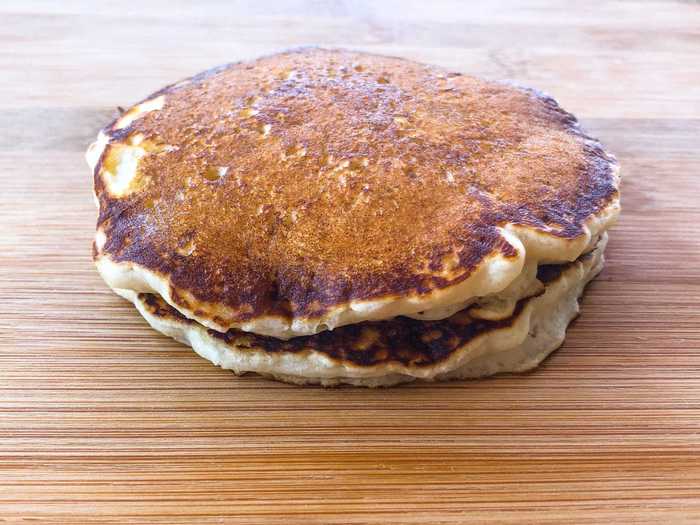
These 1/4-inch thick pancakes were really airy and moist, but they were dense at the same time.
In terms of flavor, the sweetness from the milk came through, and the texture of these cakes was melt-in-your-mouth, which felt decadent.
If you're out of eggs or are trying to conserve, simply leaving them out of this recipe is a good way to go, in my opinion.
Leaving out butter left me with a chewy pancake.
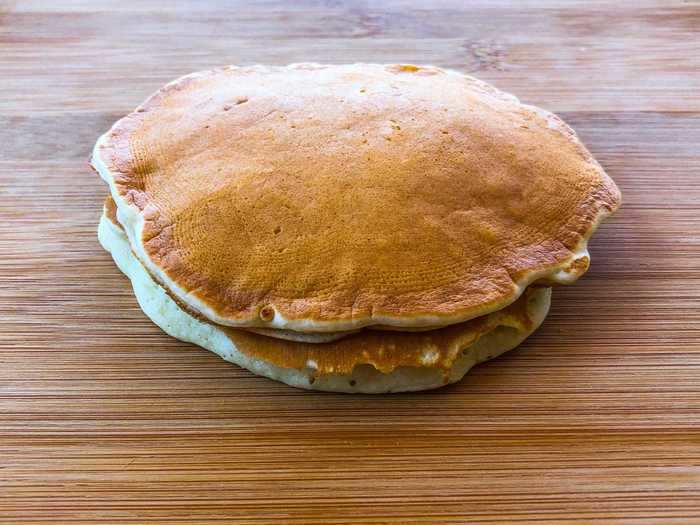
The insides of these pancakes were definitely not airy, but they weren't super dense either, and I noticed they were chewy, while I was eating them. The outside was fluffy, though, which made their chewiness somewhat of a surprise.
The pancake centers puffed up to around 1-inch thick in the pan but deflated to around 1/4 inch once I took them off the heat.
Flavor-wise, these were not as sweet as some of the others, but also not as muted as the pancakes made with extra egg.
To compare the difference between pancakes made with salted and unsalted butter, I followed the recipe without making a mistake for this batch which I made with unsalted butter.
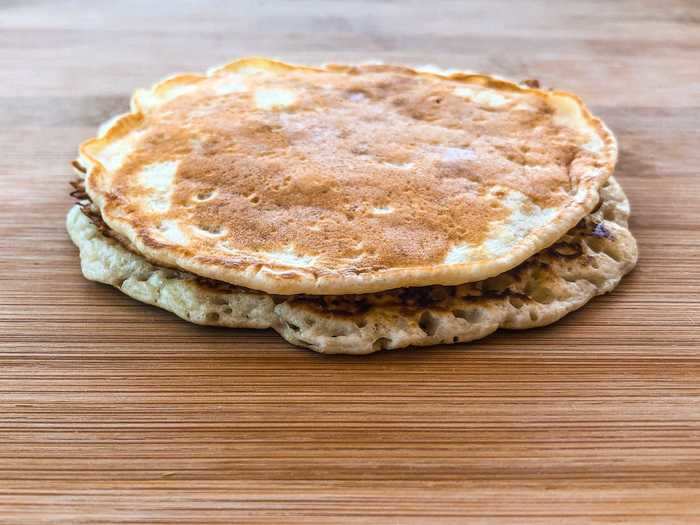
These pancakes, which were made with the unaltered version of the recipe I was using, wound up being moist and flavorful, but also dense and floppy.
They were less than 1/4-inch thick and had a classic pancake flavor. While these were perfectly fine, I'd recommend using extra flour or baking soda if you prefer fluffy pancakes.
Using salted butter made virtually no difference.
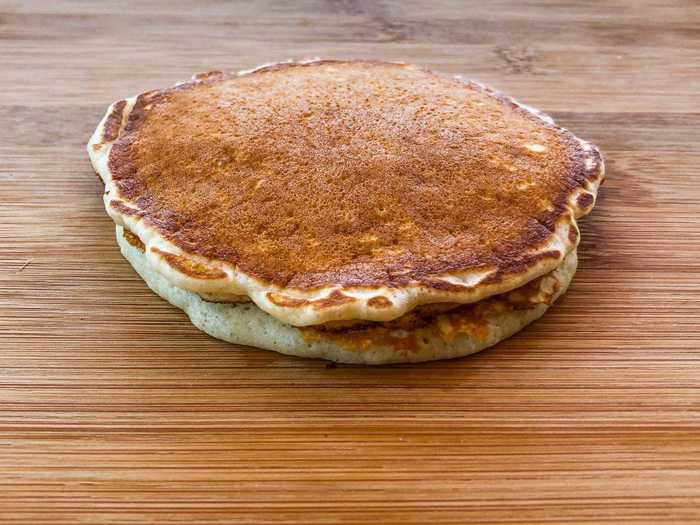
If there was a difference here between this batch with salted butter and the previous batch with unsalted butter, I couldn't tell. These were also moist, flavorful, fairly dense, and just as floppy.
So, as far as I can tell, you don't have to run out to the store if you only have salted butter on-hand.
The recipe also suggested vegetable oil as a replacement for butter. Using the oil got me a pancake that was slightly creamier in texture inside.
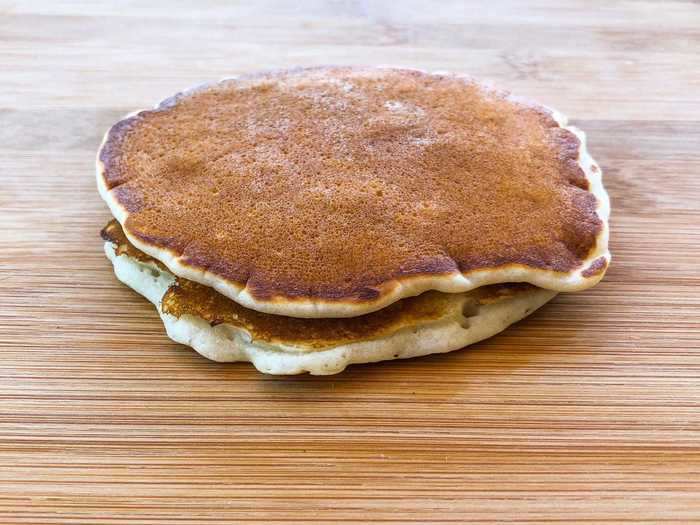
With the same outside texture, floppiness, and density as the batches made with equal amounts of butter, the inside of this vegetable oil-infused pancake was creamier in texture.
The flavor was the same as the two made with butter, so using vegetable oil is a good substitute.
I would be happy if I were given almost any of these pancake variations.
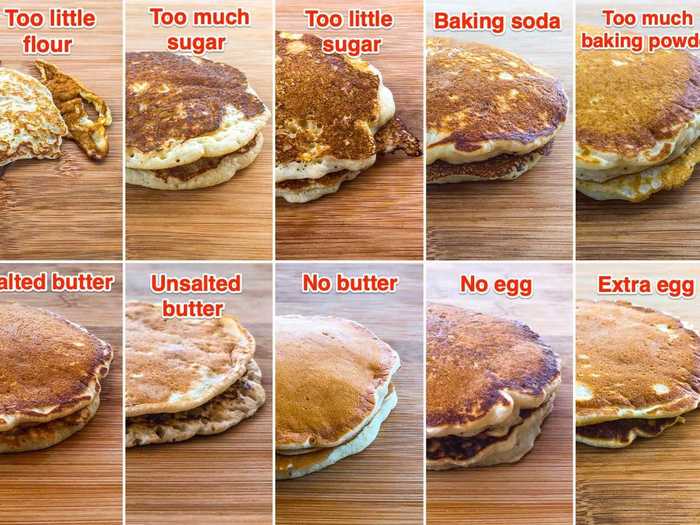
While I do have my favorites — *cough* super fluffy — I wouldn't turn down any of these pancakes with one exception: the baking soda batch, which had such a potent flavor that it clung to my taste buds for around 20 minutes.
I was also surprised by how much I enjoyed the flattened cakes made with too much milk as well as the wonderfully sweet pancake I made by leaving out eggs completely.
As a die-hard fan of classic diner pancakes when they're stuffed with chocolate and fruit and topped with jam or peanut butter, I'd encourage anyone to get creative with toppings and mix-ins. I truly don't believe you can go wrong.
- Read more:
- Photos show how common baking mistakes can drastically change your chocolate-chip cookies
- Photos show how a hard-boiled egg looks depending on how you cook it
- I'm a food reporter and these are the 11 essential items I always have in my pantry
- I made KFC fried chicken at home using a copycat recipe, and found it tasted just like the real thing
READ MORE ARTICLES ON
Popular Right Now
Advertisement